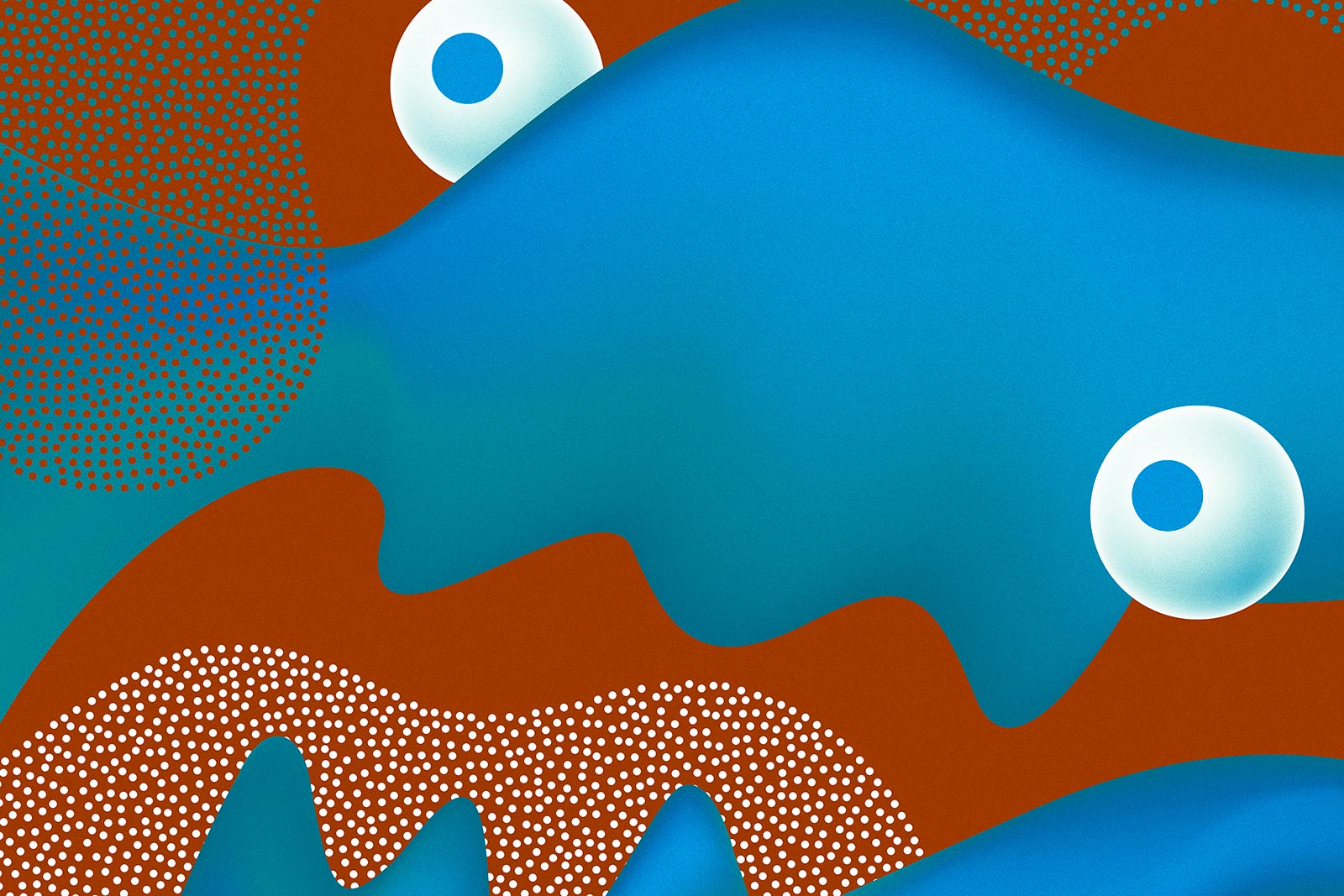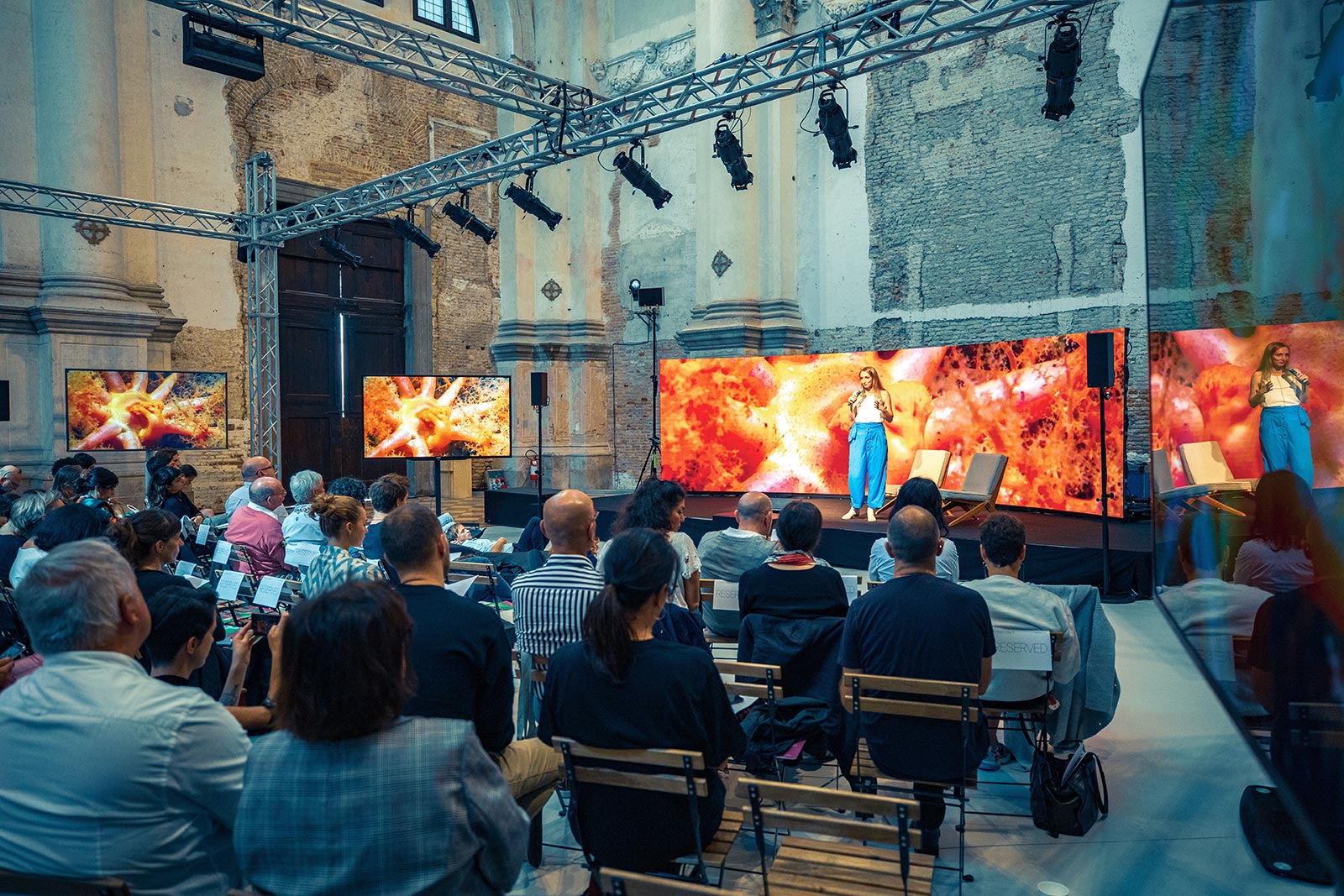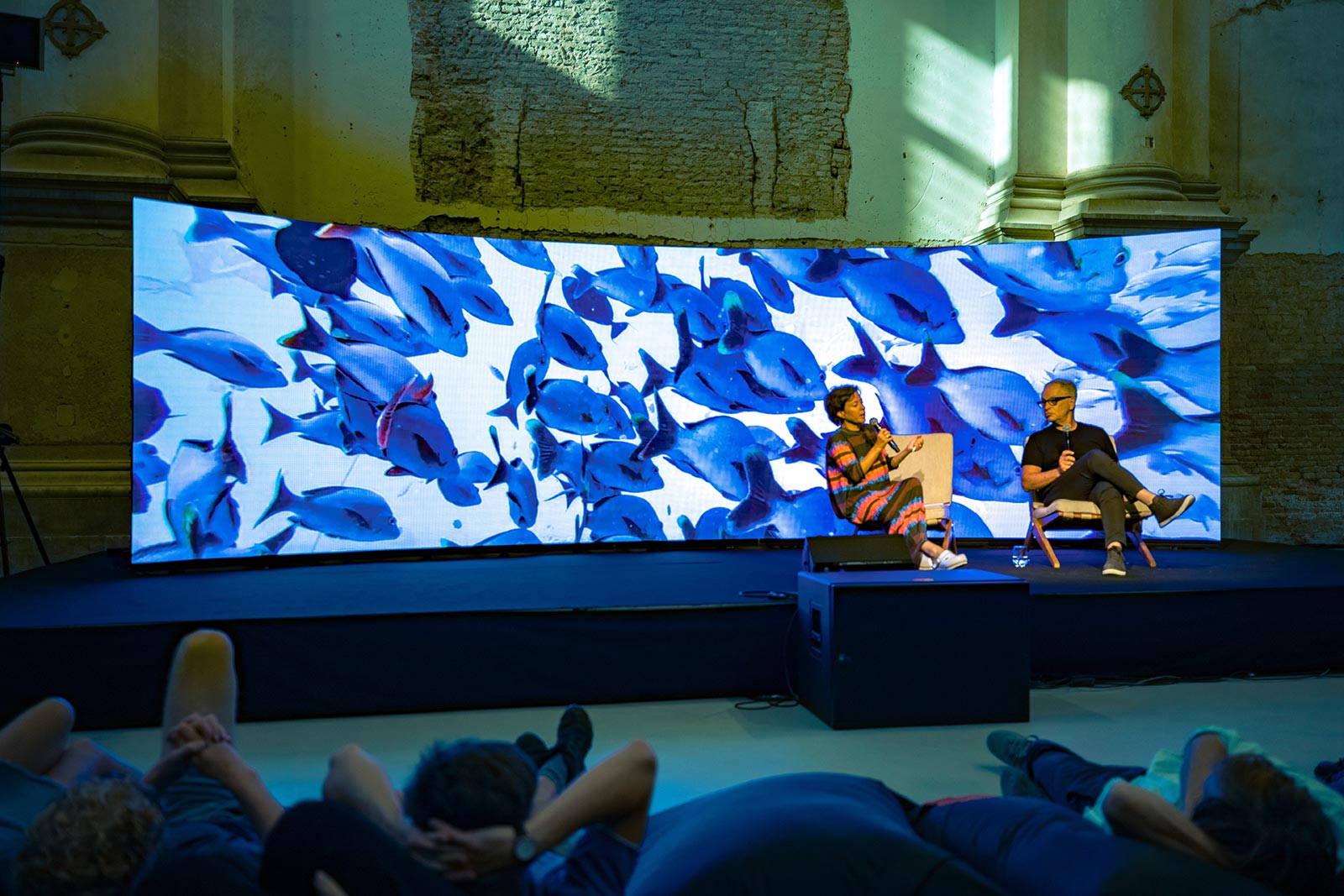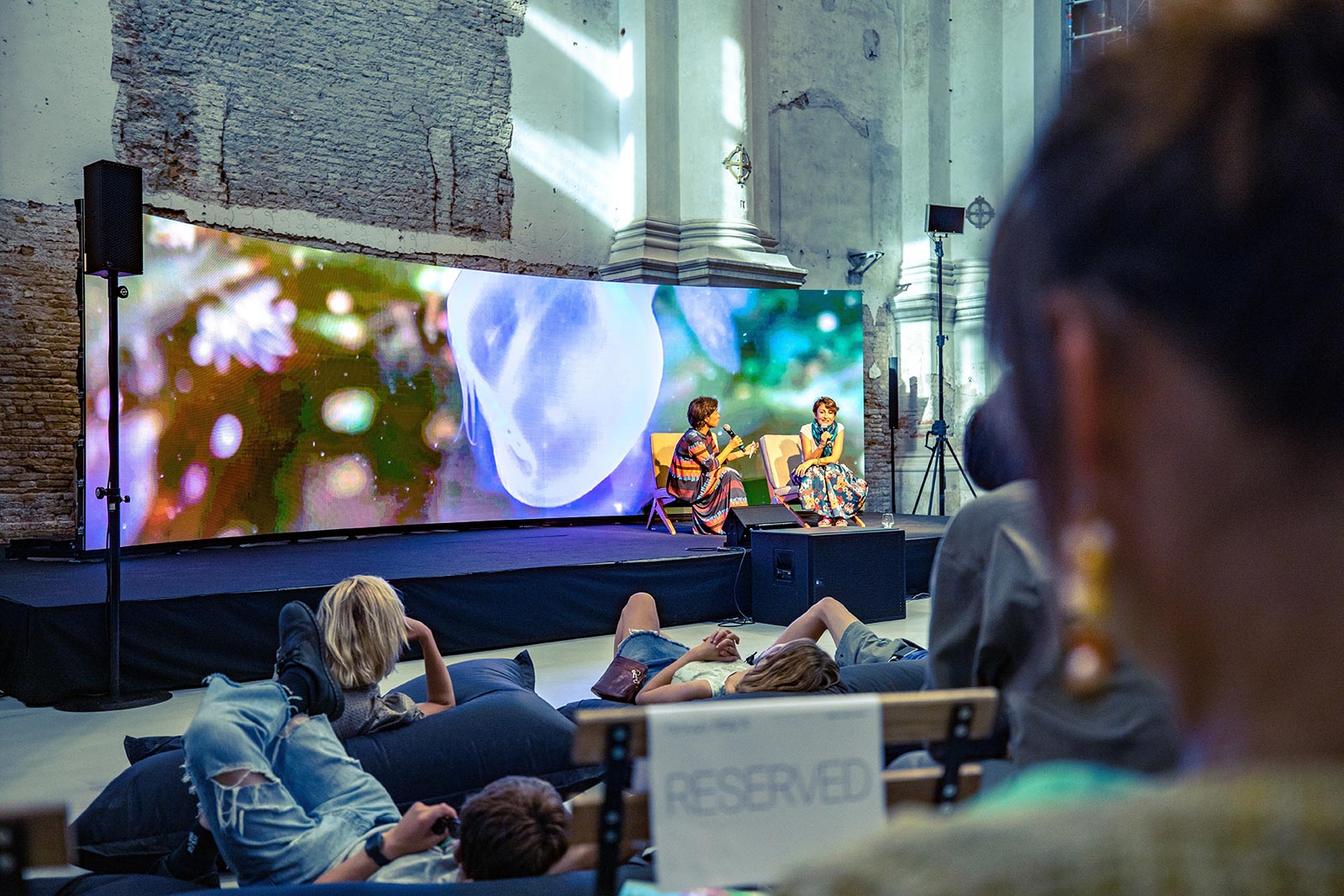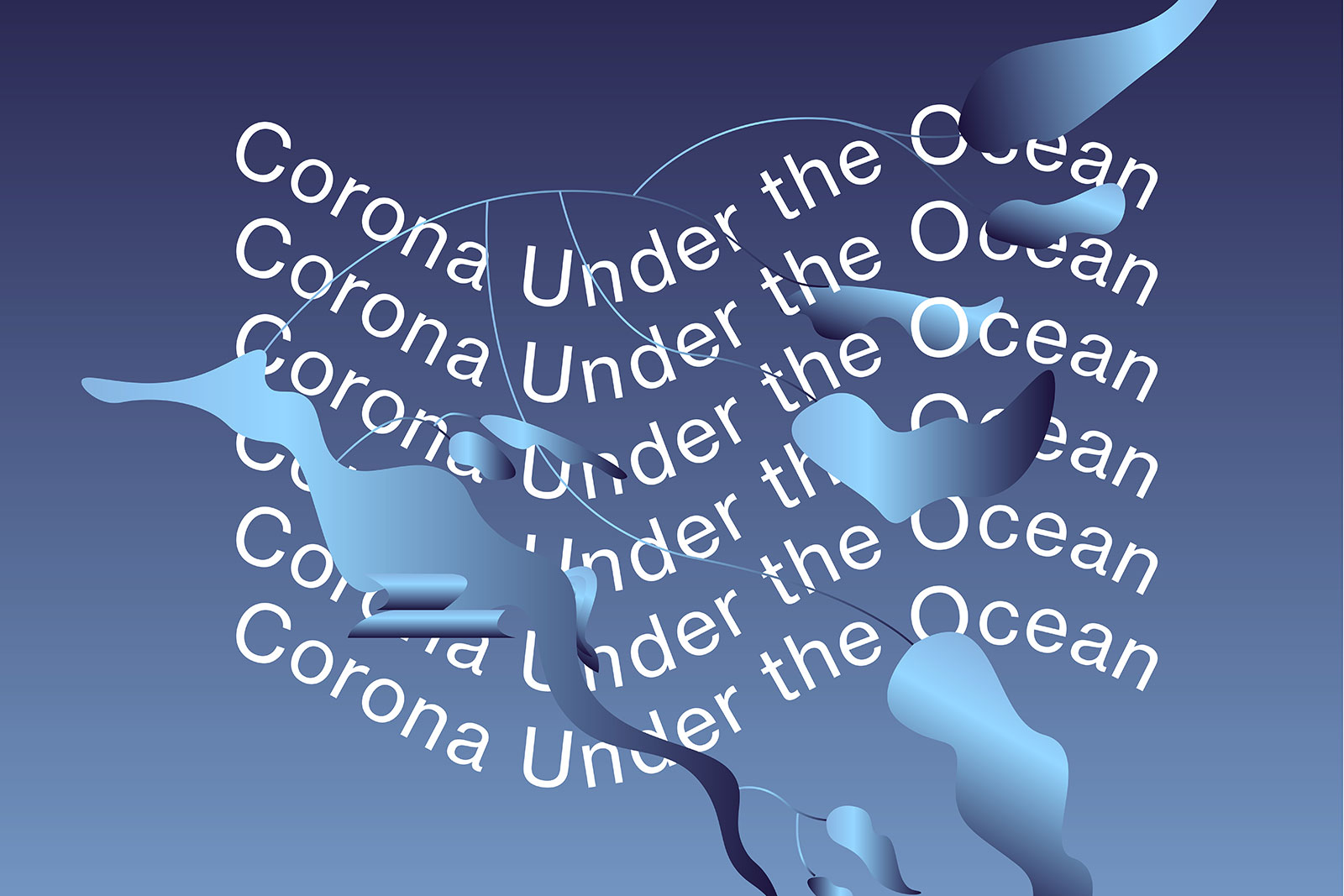Phenomenal Ocean
Phenomenal Ocean is a podcast series produced by the Institute Art Gender Nature, FHNW Academy of Art and Design in Basel and TBA21–Academy.
This podcast series explores the agency of the ocean. Can the ocean think? feel? Act? And yes, it does!
We have been collaborating with TBA21–Academy for some years now in our common pursuit of a non-binary understanding of the coexistence of culture and nature, of us and the ocean. This podcast series should therefore be viewed as the beginning of a series of humble but meaningful productions that address these very issues. Now that we are so worried about our own existence, we should also consider the existence of other nonhuman forms of life. Now that we are so anxious about our future, we may be able to understand the fear held by nature, by the oceans, by all those that have felt threatened by our actions.
We really hope you enjoy this podcast channel and we are looking forward to providing further content and artistic input here and via social media channels as well as the Ocean Archive by TBA21–Academy.
Ocean Wants
Episode 15 to 25, is a series commissioned by TBA21–Academy that playfully explores how nonhumans could like our planet to be. In each episode, writer Ingo Niermann meets with an expert from a different field to ask: What would a given species come up with if it could be as dominant as humans have been?
Corona Under the Ocean
Episode 6 to 15 present conversations between guests from various disciplines and writer and curator Sonia Fernández Pan. The series Corona Under the Ocean offers a transoceanic perspective emerging from the fields of marine science, postcolonial studies, speculative histories, and political imagination.
Phenomenal Ocean
Episode 1 to 5 are based on contributions at The Current II, Summer School, and Convening #2: Phenomenal Ocean, both led by Chus Martínez, and held at TBA21–Academy at Ocean Space in Venice in September 2019. Can what is necessary be as well pleasurable? Can a radical transformation, following the principles of feminism, anti-racism, and anti-fascism eventually be easier than we think and closer than we expect?
25 Ocean Wants: Ocean Nation feat. Markus Reymann
While the land is ruled by nations and super nations, the ocean is subject to the tragedy of the commons. What if the ocean turned into a nation of its own—the largest nation in the world?
In the tenth episode of the podcast Ocean Wants, speculative writer Ingo Niermann, most recently of the book Mare Amoris, is talking to Markus Reymann, director of TBA21-Academy and its Ocean Space in Venice. We speak at his office in Madrid.
Download episode here, or subscribe to our channel via Apple Podcasts or Spotify.
24 Ocean wants: Deep Frontier feat. Diva Amon
We can see stars thousands of light years away with our naked eye. About life in the deep sea we started to know only 200 years ago—and we still know very little. How do we have to reinvent ourselves to serve the needs of the deep sea and tame endeavors to exploit its habitats?
In the ninth episode of the podcast Ocean Wants, speculative writer Ingo Niermann, most recently of the book Mare Amoris, is talking to Diva Amon, a marine biologist focused on the deep ocean. She is also a founder and director of SpeSeas, an NGO dedicated to marine science, education, and advocacy in Trinidad and Tobago. She speaks from her family home in Trinidad.
Download episode here, or subscribe to our channel via Apple Podcasts or Spotify.
23 Ocean wants: Pain-Free Sea feat. David Pearce
Shouldn’t the reduction of suffering be our priority when taking care of others’ needs—particularly the needs of those we can’t ask? Soon, CRISPR edited gene drives could alter the pain perception and hedonic range of any sexually reproducing species.
In the eighth episode of the podcast Ocean Wants, speculative writer Ingo Niermann, most recently of the book Mare Amoris, is talking to David Pearce, a transhumanist philosopher who advocates the abolition of all negative feelings. He speaks from his home in Brighton, UK.
Download episode here, or subscribe to our channel via Apple Podcasts or Spotify.
22 Ocean wants: Canceled Ice Age feat. William Ruddiman
For the past 7000 years, humans have stabilized the global climate. The greenhouse gases emitted through deforestation, agriculture, and husbandry prevented the onset of a new glaciation. Only since the industrial revolution has human influence gotten out of hand, causing rapid rises in temperature and sea level.
In the seventh episode of the podcast Ocean Wants, speculative writer Ingo Niermann, most recently of the book Mare Amoris, is talking to William Ruddiman, geologist and originator of the early Anthropocene hypothesis. He speaks from his home in Virginia.
Download episode here, or subscribe to our channel via Apple Podcasts or Spotify.
21 Ocean wants: Conservation Libido feat. Eva Hayward
The ocean refuses empathetic ethics based on sameness with us humans. What does the urge to save nature—in certain ways—reveal about us and our desire?
In the sixth episode of the podcast Ocean Wants, speculative writer Ingo Niermann, most recently of the book Mare Amoris, is talking to Eva Hayward, historian of science and faculty member in the Department of Gender and Women Studies at the University of Arizona.
Download episode here, or subscribe to our channel via Apple Podcasts or Spotify.
20 Ocean wants: Translating Whales feat. David Gruber
To know what other humans want, we can ask them. But pets aside, modern societies lost the confidence and interest in communicating with nonhumans. Could advanced machine learning allow for an interspecies conversation, even with creatures that spend most of their time away in the deep?
In the fifth episode of the podcast Ocean Wants, speculative writer Ingo Niermann, most recently of the book Mare Amoris, is talking to David Gruber, marine biologist and leader of CETI, a multidisciplinary project on understanding the acoustic communication of sperm whales. He speaks from his home in New York.
Download episode here, or subscribe to our channel via Apple Podcasts or Spotify.
19 Ocean wants: Cephalopods on Land feat. Danna Staaf
Before fish and other vertebrates proliferated, it was the heyday of the cephalopods. Their descendants—squid, cuttlefish, octopus, and nautilus—are still around, coping better with human dominance than many fish.
In the fourth episode of the podcast Ocean Wants, speculative writer Ingo Niermann, most recently of the book Mare Amoris, is talking to Danna Staaf, a trained marine biologist who wrote the history of the cephalopods. She speaks from her home in San Jose, California.
Download episode here, or subscribe to our channel via Apple Podcasts or Spotify.
18 Ocean wants: Rise of Slime feat. Lisa-Ann Gershwin
Five hundred million years ago the ocean was dominated by jellyfish. Thanks to us, humans, they might dominate the ocean again.
In the third episode of the podcast Ocean Wants, speculative writer Ingo Niermann, most recently of the book Mare Amoris, is talking to Lisa-ann Gershwin, a marine biologist with a unique dedication and enthusiasm for jellyfish. She speaks from her home in Tasmania.
Download episode here, or subscribe to our channel via Apple Podcasts or Spotify.
17 Ocean wants: Self-Conscious Fish feat. Alex Jordan
Fish are compassionate, recognize themselves in the mirror, and fancy designed shelters over natural ones. Recent experiments contest common ideas of what distinguishes humans from smaller, non-mammalian creatures of the sea.
In the second episode of the podcast Ocean Wants, speculative writer Ingo Niermann, most recently of the book Mare Amoris, is talking to Alex Jordan, Principal Investigator at the Department of Collective Behaviour at the Max Planck Institute in Konstanz, Germany. We speak at this home near Lake Constance.
Download episode here, or subscribe to our channel via Apple Podcasts or Spotify.
16 Ocean wants: Coral Renaissance feat. Marah J. Hardt
We celebrate coral reefs as the colorful rain forests of the ocean. How could we not just save and restore existing coral reefs but allow them to spread?
In the first episode of the podcast Ocean Wants, speculative writer Ingo Niermann, most recently of the book Mare Amoris, is talking to Marah J. Hardt, marine biologist, storyteller and director of discovery at the non-profit Future of Fish. She speaks from her home in Hawaii.
Download episode here, or subscribe to our channel via Apple Podcasts or Spotify.
15 Corona Under the Ocean:
Viewing from the Inside
The the tenth and final episode of the Corona Under the Ocean series, with artist and filmmaker Su Yu Hsin, began with one of her many memories related to water, and how the appearance of light on water is indispensable for her when thinking with water. Su Yu Hsin’s homeland, Taiwan, is an island where water has a strong presence due to typhoons and the island’s atmospheric condition. In her artistic practice, she approaches ecology in its close relationship with technology, also investigating the ideology inherent to map-making throughout history and to this day. This podcast episode is the result of a conversation between Su Yu Hsin and Sonia Fernández Pan, in which they discuss how Covid-19 relates to the experience of the SARS crisis in Taiwan in the early 2000s and the collective learning that this experience meant for Taiwanese society.
Download episode here, or subscribe to our channel via Apple Podcasts or Spotify.
14 Corona Under the Ocean:
Political Action, Political Imagination
The ninth episode of the Corona Under the Ocean series, with ship captain and sea rescue activist Carola Rackete, begins with her early research in the Arctic and Antarctic, and how she experienced the melting of the poles, without the need for scientific data. That was also when she decided to engage in political action in order to have a real impact on the multiple forms of violence the capitalist system perpetrates, both human and environmental, both individual and structural. This podcast is the result of a conversation between Carola Rackete and Sonia Fernández Pan, in which the Covid-19 pandemic was present from the viewpoint of maritime life and in vessels as working environments, as well as in the reinforcement of borders and the human abuses carried out under the pretense of pandemic response.
Download episode here, or subscribe to our channel via Apple Podcasts or Spotify.
13 Corona Under the Ocean:
The colonial conditions of Western knowledge
The eighth episode, with professor and anthropologist Elizabeth Povinelli, begins with her idea of axioms of existence, which put in crisis the abstract and universalist condition of Western philosophy. The ocean is not far from Western epistemologies and ontologies. In fact, it is totally entangled in them thanks to their intimate—and strategically invisible—relationship with colonial history and violence. The notion of geontopower, coined by Povinelli, critically revises the Foucauldian notion of biopower. The fictional but real frontier between life and non-life is a political frontier in continuous expansion, even beyond Earth. This podcast is the result of a conversation between Elizabeth Povinelli and Sonia Fernández Pan, in which the coronavirus was also present along with the idea of the virus as a rhetorical figure.
Download episode here, or subscribe to our channel via Apple Podcasts or Spotify.
12 Corona Under the Ocean:
THE SEA UNDOES THE LAND
The seventh episode, with curator Camila Marambio is an approach to Tierra del Fuego from her personal experience with a part of the world with which she has a strong emotional connection. As she states, Tierra del Fuego, "despite its remoteness, is the center of the world". Karokynka is the name by which this area of the world is known by the native Selk'nam people, a culture that still survives in its descendants despite its official death by the modern state of Chile. The fact of proclaiming as dead, a culture that is still very much alive, is part of the colonial project, transformed into white melancholy and colonizing mourning. This podcast is the result of a conversation between Camila Marambio and Sonia Fernández Pan, during an inspiring encounter in which they were also accompanied by many other voices and forms of tidal storytelling.
Download episode here, or subscribe to our channel via Apple Podcasts or Spotify.
11 Corona Under the Ocean:
Underwater Projections
The sixth episode, with writer, lecturer, and curator Filipa Ramos is an approach to cinema from the ocean and to the ocean from cinema. Beyond the production of underwater images, there is a political relationship between cinema and the underwater world. As vision devices, the projection room and the tank or aquarium are related in their production of the fiction of a safe environment for the human being. Moreover, there are aquatic creatures capable of producing cinematic images, allowing an expansion of the concept of cinema beyond its own history and human history. This podcast is the result of a conversation between Filipa Ramos and Sonia Fernández Pan, in which the coronavirus was introduced from an animist perspective and proposes a criticism of the system in which it involuntarily operates.
Download episode here, or subscribe to our channel via Apple Podcasts or Spotify.
10 Corona Under the Ocean:
THINKING WITH WATER
The fifth episode of the Corona Under the Ocean series, featuring feminist philosopher Astrida Neimanis, puts into practice one of the author's methodologies: “thinking with water.” As a material, water not only enables a relational ontology when thinking about the reality that bodies inhabit and produce, but also allows for an understanding of feminism that transcends the human and incorporates a planetary and intersectional scale where race, class, and gender are in constant intra-action. This podcast is the result of a conversation between Astrida Neimanis and Sonia Fernández Pan, where the Covid-19 pandemic was also a constant, an atmospheric condition that is, in turn, political and ideological.
Download episode here, or subscribe to our channel via Apple Podcasts or Spotify.
9 Corona Under the Ocean:
Water has Memory
The fourth episode of the Corona Under the Ocean series, with agent of healing and artist Tabita Rezaire, is dedicated to the memory of water and its existence in flow within bodies. Water has Memory is the result of an intimate, personal, and mostly unscripted conversation between Tabita Rezaire and Sonia Fernandez Pan. It even includes environmental elements, such as rain, showing how words, feelings, and ideas are also part of the flow of life that circulates through bodies. The great connecting element of this conversation is water, understood beyond its usual contexts to think through connections and interactions including the internet, colonialism, various healing strategies, spiritual states, and forms of meaning beyond words.
Download episode here, or subscribe to our channel via Apple Podcasts or Spotify.
8 Corona Under the Ocean:
Sea Nomads – The Orang Suku Laut
The third episode of the Corona Under the Ocean chapter, featuring anthropology professor Cynthia Chou, is dedicated to the Orang Suku Laut, a nomadic community from the Malay world sea in Southeast Asia. Thanks to more than three decades of research, Cynthia Chou’s work brings us closer to the worldview and life practices of the Orang Suku Laut, for whom humans are just another element among the many creatures that inhabit oceans and land. Continually moved by the tides, their ancestral relationship with the environment not only puts many aspects of modern societies into question, but shows that another kind or relationship with the environment is possible, one that is reciprocal, cordial and without a hierarchy between the human and the nonhuman.
Download episode here, or subscribe to our channel via Apple Podcasts or Spotify.
7 Corona Under the Ocean:
We are Ocean Life
This episode, featuring marine biologist Marah J. Hardt, is dedicated to the vitalism and resilience of the ocean. Outlining her personal journey as a researcher, Marah J. Hardt provides a propositional critique of our relationship with the maritime environment, present but not always visible on a global scale. Understanding ocean research as a necessarily interdisciplinary practice, her scientific practice highlights the importance of storytelling as a tool for dissemination of ideas. In We are Ocean Life, she not only reminds us that all forms of life, including human life, come from the ocean, but also brings us closer to the amazing and exciting sexuality of fish.
Download episode here, or subscribe to our channel via Apple Podcasts or Spotify.
6 Corona Under the Ocean:
Oceanizing History
The first episode of the series Corona Under the Ocean is dedicated to Oceania. Did you know that the Pacific Ocean was named so by Ferdinand Magellan, referring to his feeling that the sea was dull over there? In this conversation Greg Dvorak, Professor of International Cultural Studies at Waseda University in Tokyo, reflects on how the colonizer’s view has affected the region and, on how the word indigenous needs to gain even more political meaning.
Download episode here, or subscribe to our channel via Apple Podcasts or Spotify.
5 Facts and Fiction
Our nature inclines us to listen to stories, not to lists, charts, and equations. To change our mind, we need a compelling narrative that turns obstacles into challenges and chances into hopes. The role of art is to foster that transformation, but also to spoil it wherever it’s lame.
Listen to Chus Martínez in conversation with artists Lena Maria Thüring and Teresa Solar.
Download episode here, or subscribe to our channel via Apple Podcasts or Spotify.
4 Law of the sea
If it’s already difficult to protect nature in our own country, how do we protect nature in the extraterritorial sea? And who is there to protect the nature—and the people—of a country that is disappearing into the sea?
Listen to Chus Martínez in conversation with Francesca Mussi, a researcher in international law.
Download episode here, or subscribe to our channel via Apple Podcasts or Spotify.
3 Challenging the Format
Science has to generate output. Art has to cater to an audience. Could art and science join forces to free science from definite outputs and art from definite audiences? Or would art then also be measured by its outcome and science by its audience?
Listen to Chus Martínez in conversation with artists Julieta Aranda, Marco Roso, and Elena Mazzi.
Download episode here, or subscribe to our channel via Apple Podcasts or Spotify.
2 The Beginning of the Line
We affirm ourselves as the center of evolution by saving it from our own destruction. Our new heroism is to keep things, at best, as bad as they are. What does good even mean? We are the joke of evolution—and nobody’s laughing.
Listen to Chus Martínez in conversation with marine scientist Skye Morét and writer Ingo Niermann.
Download episode here, or subscribe to our channel via Apple Podcasts or Spotify.
1 Not Enough Data
We can’t exist beyond nature but science can? Now that we’re doomed, can we at least free science from us? Is the era of a true, posthuman science about to begin or will science be destroyed by our vain efforts to save ourselves?
Listen to Chus Martínez in conversation with marine scientist Marzia Rovere and geneticist Alexander Tarakhovsky.
Download episode here, or subscribe to our channel via Apple Podcasts or Spotify.
Introduction: The Disaster Is Behind Us
We tried to free ourselves from nature but exploited it to the point of self-destruction. Nature seems to have brought us back, but we actually never left. We just forgot about nature—including our very own.
Listen to Chus Martínez, head of the Art Institute in Basel, Markus Reymann, director of TBA21–Academy, and marine scientist Skye Morét.
Download episode here, or subscribe to our channel via Apple Podcasts or Spotify.
Credits
Episodes 16–25
Commisioned and produced by TBA21–Academy
Conceived, hosted, and edited by Ingo Niermann
Music composed and arranged by Ville Haimala
Intro read by Joan Jonas
Credits read by Staci Bu Shea
Sound edited by Robin Michel
Produced by Ingo Niermann and María Montero Sierra
Ocean Wants was commissioned to celebrate TBA21–Academy’s tenth Anniversary.
Episodes 6 – 15
Production: Institute Art Gender Nature and TBA21–Academy
Recording and editing: Sonia Fernández Pan and guests
Final editing: Elena Zieser
Voice-over: Nathan Johnson
Music: Stephen McEvoy
Introduction and episodes 1 – 5
Production: Institute Art Gender Nature and TBA21–Academy
Author of connecting text: Ingo Niermann
Speaker: Bettina Wiehler
Sound track: Sound from All Bleeding Stops Eventually, a series of six videos created by Will Benedict, produced by DIS.ART and commissioned by TBA21–Academy
Editing and Sound design: Elena Zieser
Recording: Phoenix
Research team Institute Art Gender Nature: Marion Ritzmann, Tabea Rothfuchs, Alice Wilke (until 2021)
Producer and Program Coordinator TBA21–Academy: María Montero Sierra
Technical Support and recording: Karin Borer, Esther Hunziker, TBA21-Academy, Mark Ferkul
Press and communication: Anna Francke, Katarina Rakuscek
Graphic Design: Ana Domínguez Studio
© Institute Art Gender Nature HGK FHNW in Basel and TBA21–Academy




